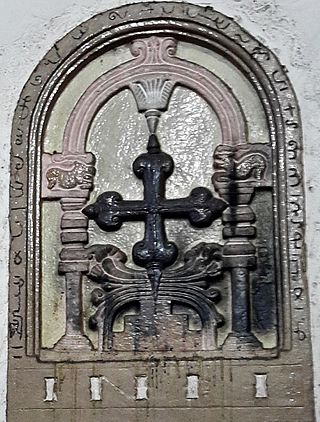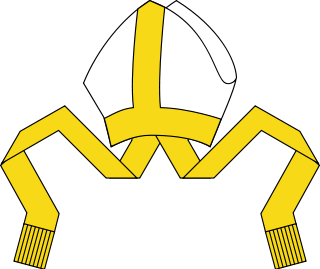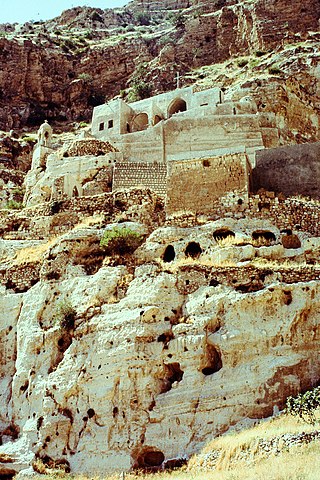
The Assyrian Church of the East (ACOE), sometimes called Church of the East, officially the Holy Apostolic Catholic Assyrian Church of the East, is an Eastern Christian church that follows the traditional Christology and ecclesiology of the historical Church of the East. It belongs to the eastern branch of Syriac Christianity, and employs the Divine Liturgy of Saints Addai and Mari belonging to the East Syriac Rite. Its main liturgical language is Classical Syriac, a dialect of Eastern Aramaic, and the majority of its adherents are ethnic Assyrians.

The Syro-Malabar Catholic Church is an Eastern Catholic church based in Kerala, India. The Syro-Malabar Church is an autonomous particular church in full communion with the pope and the worldwide Catholic Church, including the Latin Church and the 22 other Eastern Catholic churches, with self-governance under the Code of Canons of the Eastern Churches (CCEO). The Church is headed by the Major Archbishop of the Syro-Malabar, currently George Alencherry. The Syro-Malabar Synod of Bishops canonically convoked and presided over by the Major Archbishop constitutes the supreme authority of the Church. The Major Archiepiscopal Curia of the Church is based in Kakkanad, Kochi. Syro-Malabar is a prefix reflecting the church's use of the East Syriac Rite liturgy and origins in Malabar. The name has been in usage in official Vatican documents since the nineteenth century.

The Holy Qurbana, refers to the Eucharistic liturgy as celebrated in East Syriac Christianity and the liturgical books containing the rubrics for its celebration. Churches that celebrate this liturgy include various descendants of the Church of the East. East Syriac Christianity consists of an Edessan liturgical rite called the East Syriac Rite. The major anaphora of the East Syriac tradition is the Holy Qurbana of Saints Addai and Mari; Addai being a disciple of Thomas the Apostle and Mari being Addai's disciple. These churches are primarily based in the Middle East and India, with diasporic communities settled in the western world.

Mar Dinkha IV, born Dinkha Khanania was an Eastern Christian prelate who served as the 120th Catholicos-Patriarch of the Assyrian Church of the East. He was born in the village of Darbandokeh (Derbendoki), Iraq and led the Church in exile in Chicago for most of his life.

The Chaldean Syrian Church of India is an Eastern Christian denomination, based in Thrissur, in India. It is organized as a metropolitan province of the Assyrian Church of the East, and represents traditional Christian communities of the East Syriac Rite along the Malabar Coast of India. It is headed by Mar Aprem Mooken, Metropolitan of India, who is in full communion with Patriarch Mar Awa III, head of the Assyrian Church of the East. Metropolitan is assisted by two Bishops, Mar Yohannan Yoseph, and Mar Awgin Kuriakose.

Thoma Darmo was the Catholicos-Patriarch of the Ancient Church of the East, from 1968 to 1969. Prior to that, he served as Metropolitan of India, from 1952 to 1964, within the Church of the East.

The Ancient Church of the East is an Eastern Christian denomination. It branched from the Assyrian Church of the East in 1964, under the leadership of Mar Thoma Darmo. It is one of three Assyrian Churches that claim continuity with the historical Church of the East, the others being the Assyrian Church of the East and the Chaldean Catholic Church. The Ancient Church of the East is headquartered in Baghdad, Iraq.

Mar Gewargis III served as the 121st Catholicos-Patriarch of the Assyrian Church of the East. On 18 September 2015, the Holy Synod of the Assyrian Church of the East elected Mar Gewargis Sliwa to succeed the late Mar Dinkha IV as the head of the Church. On 27 September 2015, he was formally consecrated and enthroned as Catholicos-Patriarch.

Mar Addai II was Iraqi Catholicos-Patriarch of the Ancient Church of the East. He resided in the Apostolic See of Seleucia-Ctesiphon in Baghdad, Iraq.
Holy See of the East is an honorary name of the sees of a number of Christian churches in the Middle East and India.

Dioceses of the Church of the East after 1552 were dioceses of the Church of the East and its subsequent branches, both traditionalist and pro-Catholic.

Mar Aprem Mooken is the Metropolitan of the Assyrian Church of the East in India.

Mar Eshai Shimun XXIII, sometimes known as Mar Eshai Shimun XXI, Mar Shimun XXIII Ishaya, Mar Shimun Ishai, or Simon Jesse, served as the 119th Catholicos-Patriarch of the Assyrian Church of the East from 1920, when he was a youth, until his murder on 6 November 1975.

Mar Yohannan, also known as a monk Yoseph of Awgin, was Bishop of India, a metropolitan province of the Church of the East. In 1490, envoys of Saint Thomas Christians from the Malabar Coast in India traveled to Mesopotamia and arrived in Gazarta, bringing appeals to the hierarchy of the Church of the East, and asking for new bishops. Patriarch Shemon IV responded positively to their request and arranged the selection of two monks from the Awgin Monastery, both of them called Yoseph, appointing them as bishops, under new names: Mar Yohannan and Mar Thoma, and dispatching them to India. Mar Yohannan stayed in India, while Mar Thomas returned to Mesopotamia. In 1503, three new bishops were sent to India, by new Patriarch Eliya V: Mar Yahballaha, Mar Dinkha and Mar Yaqob. Upon arrival, they met with Mar Yohannan. Activities of Mar Yohannan and other bishops reaffirmed traditional ties between Christians of India and the Church of the East. By that time, local Christians of the Malabar Coast were also facing some additional challenges, caused by the establishment of Portuguese presence in India.

Several historical evidences shed light on a significant Malankara–Persian ecclesiastical relationship that spanned centuries. While an ecclesiastical relationship existed between the Saint Thomas Christians of India and the Church in Sassanid Empire in the earlier centuries, closer ecclesiastical ties developed as early as seventh century, when India became an ecclesiastical province of the Church of the East, albeit restricted to matters of purely ecclesiastical nature such as ordination of priests, and not involved in matters of temporal administration. This relationship endured until the Portuguese protectorate of Cochin of Malabar came to be in 16th century, and the Portuguese discovery of a sea route to India. The Christians who came under the two ancient yet distinct lineages of Malankara and Persia had one factor in common: their Saint Thomas heritage. The Church of the East shared communion with the Great Church until the Council of Ephesus in the 5th century, separating primarily over differences in Christology.

Bawai Soro is the former Eparch of the Chaldean Catholic Church for the Chaldean Catholic Eparchy of Mar Addai of Toronto.

Mar Abimalek Timotheus was an Assyrian priest of the Church of the East who served as Metropolitan of Malabar and All India from 1907 until his death in 1945. Born in the village of Mar Bisho in the Ottoman Empire, he was sent to India by Catholicos-Patriarch Shimun XIX after Shimun received a petition to appoint a bishop from the Chaldean Syrian Church in Trichur.

Eliya X was Patriarch of the Church of the East from 1700 to 1722, with residence in Rabban Hormizd Monastery, near Alqosh, in modern Iraq. During his tenure, traditional ties of the Patriarchate with the remaining Christian community of the East Syriac Rite in India were re-established, and in 1708 bishop Mar Gabriel was sent there by the Patriarch, succeeding upon arrival to the Malabar Coast to revive the local East Syriac Christian community.

The Paḻayakūṟ (Pazhayakoor) or Romo-Syrians or Syrian Catholics of Malabar refers to the East Syriac denominations of the Saint Thomas Christian Church, which claim ultimate apostolic origin from the Indian mission of Thomas the Apostle in the 1st century AD. The Paḻayakūṟ descends from the faction that remained within the Catholic fold and held fast to an East Syriac identity after the historic Coonan Cross Oath of 1653 while being part of the community seceded from the Portuguese Padroado. The modern descendants of the Paḻayakūṟ are the Syro-Malabar Church and the Chaldean Syrian Church. Among these, the former is an Eastern Catholic church in full Communion with the Holy See and the latter is an integral part of the Assyrian Church of the East, one of the traditionalist descendants of the Church of the East.
















